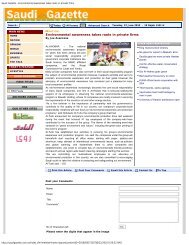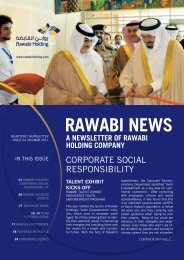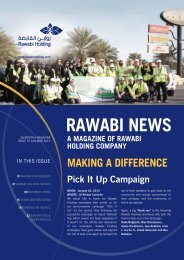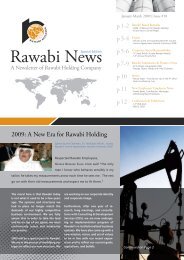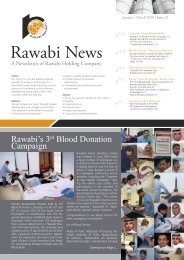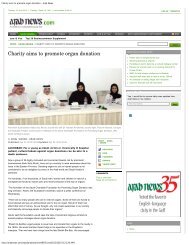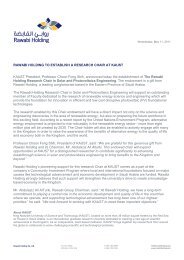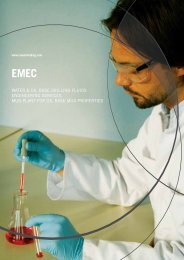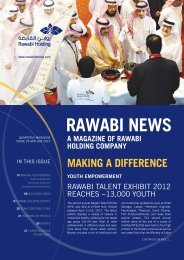Rawabi Holding Newsletter Issue 26
Rawabi Holding Newsletter Issue 26
Rawabi Holding Newsletter Issue 26
You also want an ePaper? Increase the reach of your titles
YUMPU automatically turns print PDFs into web optimized ePapers that Google loves.
IHAB KHAYYAT<br />
Assistant to Group VP,<br />
Oilfield Services<br />
TEAM CONTRIBUTIONS<br />
TOTAL QUALITY<br />
MANAGEMENT<br />
The King Abdulaziz Quality Award is a yearly award that recognizes<br />
the economic benefit of quality management, because Total<br />
Quality Management (TQM) promotes the adoption of proven methods,<br />
principles, and practices as an enablement for competing globally and<br />
delivering the expectations of customers. TQM, at the very core, is a<br />
long-term management approach to customer satisfaction. Members of<br />
an organization take part in improving processes, products, services,<br />
and the environment or culture in which they work. In my career, perhaps<br />
the TQM concept and qualifications I have received made a deterministic<br />
impact on my professional transformation and managerial<br />
style. It created a perspective of continuous improvement and focus<br />
on the quality of my outputs. I have come to hold this personal belief<br />
that what Prophet Mohammad meant by “whomever of you undertakes<br />
a job must excel at it”; that it is exactly what TQM is all about. TQM is<br />
a system or set of work management practices throughout the organization,<br />
geared to ensure the organization consistently meets or exceeds<br />
customer requirements. Customers can be external clients or internal<br />
departments. In this article, through a collection of previous literature,<br />
I intend to provide exposure to a concept that is the basis of operations<br />
in the industrially advanced world and hope that it would insight the<br />
reader’s curiosity.<br />
Total Quality is a description of the<br />
culture, attitude and organization of<br />
a company that aims to provide, and<br />
continue to provide its customers with<br />
products and services that satisfy their<br />
needs. The culture requires quality in<br />
all aspects of the company’s operations,<br />
with things being done right the<br />
first time, and defects and waste eradicated<br />
from operations.<br />
The core concept underlying TQM is<br />
what is known as Deming’s 14 points<br />
which, in my experience, can be adopted<br />
even at the personal level. These<br />
are a set of management practices that<br />
will result in improved quality and productivity:<br />
1. Create constancy of purpose.<br />
2. Adopt philosophy of prevention.<br />
3. Cease mass process inspection.<br />
4. End the practice of rewarding<br />
business on competitive pricing<br />
alone; instead, minimize total<br />
cost by developing your preferred,<br />
approved supplier(s).<br />
5. Constantly improve every process<br />
for planning, production, and service.<br />
6. Institute training on the job.<br />
7. Adopt and institute leadership.<br />
8. Eliminate fear among employees.<br />
9. Eliminate barriers between staff<br />
areas.<br />
10. Eliminate slogans and targets for<br />
workforce.<br />
11. Eliminate numerical quotas for<br />
staff and numerical goals for<br />
management. This is not to be<br />
confused with performance KPIs.<br />
12. Remove barriers that rob people<br />
of pride of workmanship and eliminate<br />
the annual rating or merit<br />
system.<br />
13. Institute a vigorous program of<br />
education and self-improvement<br />
in the company to work.<br />
14. Put everybody in the company to<br />
work accomplishing the transformation.<br />
Adopting TQM in an organization is<br />
not something that happens overnight<br />
because there are some underlying<br />
philosophies that the company and<br />
employees must integrate throughout<br />
processes and at every level of management.<br />
The philosophies or principles<br />
must be the basis of all your activities.<br />
In my experience and practice, I found<br />
important aspects of TQM to include<br />
customer-driven quality, top management<br />
leadership and commitment, continuous<br />
improvement, fast response,<br />
actions based on facts, employee participation,<br />
and a TQM culture.<br />
CUSTOMER-DRIVEN QUALITY<br />
TQM has a customer-first orientation.<br />
The customer, not internal activities<br />
and constraints, comes first. Customer<br />
satisfaction is seen as the company’s<br />
highest priority. The company believes<br />
it will only be successful if customers<br />
are satisfied. A TQM company is sensitive<br />
to customer requirements and<br />
responds rapidly to them. In the TQM<br />
context, `being sensitive to customer<br />
requirements’ goes beyond defects and<br />
reduction of error and merely meeting<br />
specifications or reducing customer<br />
complaints. The concept of requirements<br />
is expanded to take in not only<br />
product and service attributes that<br />
meet basic requirements, but also<br />
those that enhance and differentiate<br />
them for competitive advantage.<br />
Each part of the company is involved in<br />
total quality, operating as a customer<br />
to some functions and as a supplier to<br />
others. The Engineering Department<br />
is a supplier to downstream functions<br />
such as Manufacturing and Field Service,<br />
and has to treat these internal<br />
customers with the same sensitivity<br />
and responsiveness as it would external<br />
customers.<br />
TQM LEADERSHIP FROM<br />
TOP MANAGEMENT<br />
TQM is a way of life for a company. It<br />
has to be introduced and led by top<br />
management. This is a key point. Attempts<br />
to implement TQM can fail if<br />
top management doesn’t lead and<br />
get committed - instead it delegates.<br />
Commitment and personal involvement<br />
is required from top management in<br />
creating and deploying clear quality<br />
values and goals consistent with the<br />
objectives of the company, and in creating<br />
and deploying well defined systems,<br />
methods and performance measures<br />
for achieving those goals. These<br />
systems and methods guide all quality<br />
activities and encourage participation<br />
by all employees. The development<br />
and use of performance indicators is<br />
linked, directly or indirectly, to cus-<br />
Total Quality is a<br />
description of the culture,<br />
attitude and organization<br />
of a company that aims<br />
to provide, and continue<br />
to provide its customers<br />
with products and<br />
services that satisfy their<br />
needs.<br />
16 <strong>Rawabi</strong> News <strong>Issue</strong> <strong>26</strong> Jul-Sep 2011<br />
<strong>Rawabi</strong> News <strong>Issue</strong> <strong>26</strong> Jul-Sep 2011<br />
17



